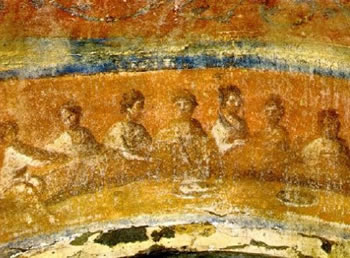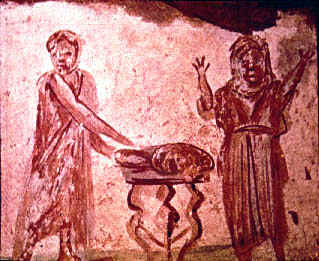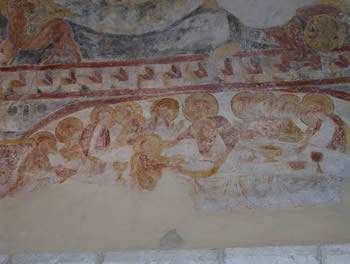Eating flesh and drinking blood
Sermon preached by Rev Charles Royden Ordinary 20 Year B 2012
As we read through John’s Gospel we are aware that frequently there are times when Jesus speaks and people take his words very literally when he is speaking at a spiritual level. This happens with Nicodemus when Jesus says that we must be born again. Obviously we cannot be physically born twice, Jesus is speaking of a spiritual awakening. It happens when Jesus meets a woman at a well and offers her living water so that she will never be thirsty again. Jesus wants to quench her spiritual thirst, he doesn’t promise never ending water.
Jesus was facing a problem in getting his message across because people were becoming preoccupied with materialistic fulfilment and missing the spiritual message. There was a problem when Jesus fed the hungry crowds from a few small loaves because the people understandably saw Jesus as ticket to a free lunch. These were poor people and when they saw somebody who was capable of mass producing food it was little wonder that they chased Jesus around Lake Galilee. We often read the suggestion that the miraculous feedings could be explained as Jesus teaching the crowd to share. On one level it appeals to us today but we need to recognise that the frenzy which followed resulted from hungry people who had suddenly found somebody who created food like magic and they wanted more. The crowds wanted full tummies and they wanted their sick people made well. Somehow Jesus had to prevent the sign becoming more powerful than the message. Jesus cares for the hungry and sick, really he does, but he needs to tell people that it is he who is the living bread, the living water. The flesh is of importance to God, but the spiritual truths are even more important, man cannot live by bread alone. The people were in danger of becoming like the Israelites in the desert, eating manna which satisfied their hunger, but not receiving the spiritual food which gave eternal life. This is surely just as true today as it ever was. Every single living body has within a soul to feed and for many people the soul has been starved of nourishment.
It is for this reason that Jesus now uses language which many have found distasteful ever since. Jesus tells them that he is offering them himself to eat, that he is the living bread. We have already been warned tat the beginning of the Gospel that Jesus is the word made flesh (1:14). Now Jesus takes this further and uses language which is powerful, confusing, perhaps disgusting but certainly shocking
"Whoever eats my flesh and drinks my blood has eternal life
and I will raise that one up on the last day."
It was a common view in Greek philosophy that the physical world was impure and corrupt, and no self-respecting god should have anything to do with it, this later came to be the view of certain Christians - the "gnostics." Jesus associating himself so closely with the physical stuff of creation and humanity is an affirmation of the essential goodness of the God created physical world. However the description of eating Jesus flesh raises images of cannibalism, a charge which was later laid against Christians. To eat the flesh of somebody was horrible and drinking blood was considered a blasphemous act forbidden by God. In the new world order after the flood God commanded Noah ‘You shall not eat flesh with its life, that is, its blood," (Genesis 9:4) The law of Moses equally forbade the drinking of blood, (Lev 17:10) or even meat with the blood still in it. It is verses of scripture like this which prompt Jehovah’s Witnesses to abstain from blood transfusion still today.
The words of Jesus would have been shocking, we know from the passage that the hearers at the time were confused, even though they would surely not have thought that Jesus was literally going to offer himself as a banquet. However it would become clear later in the Gospel what the spiritual meaning was. There is no way that the first readers of the Gospel could read these words of Jesus without thinking of the Lord’s Supper. They would be driven to recognise that the signs which Jesus used were there to enable his hearers to have faith in him.
We are fortunate also to be able to read this in the context of later understanding of the communion or eucharist and the words which Jesus used
"… the bread that I will give is my flesh for the life of the world."
Flesh and blood is an expression which we use to signify the whole person, so Jesus is giving all of himself to be our life – first on the cross and at our communion celebration. It is no wonder then that the Last Supper is something which we celebrate as a central part of faith for us. It is a focal point for all we believe, all we are and all we do. Here we are gathered around the Word, Bread and the Cup, Jesus’ gift of his total self. We in turn, give our whole selves to him by partaking in the Eucharistic feast. We are to come to the Eucharist then with fresh ears to hear and open hearts to receive – to hear the Word and to receive the Bread broken and shared. Charles Royden
Were the First Christians Cannibals?
"Eat My Flesh, Drink My Blood"
journeywithjesus.net
John 6:56–59
One of the most scurrilous charges against early Christians was that they practiced ritual cannibalism. These charges were common enough that numerous second century writers felt constrained to refute them. The earliest explicit reference we have comes from Justin Martyr in Palestine around the year 150 AD. A few decades later in north Africa, Tertullian employed mock exaggeration to refute the claims: ‘Come! plunge the knife into the baby, nobody’s enemy, guilty of nothing, everybody’s child. . . catch the infant blood; steep your bread with it; eat and enjoy it’ (Apol. 8.2).
Charges of cannibalism might have been a case of mistaken identity; similar charges were made against Jews, and since the first Christians were all Jews they were often lumped together within them. Invoking a transgressive stereotype like cannibalism, regardless of whether it was true, was also a common way to marginalize any number of Greco-Roman groups of the day as dangerous threats to social norms — and early Christians certainly threatened social norms.
 |
Eucharist fresco. |
A simpler explanation for the charges of cannibalism was confusion surrounding the "flesh and blood" eucharistic rituals of the early believers. This week's gospel is a case in point.
John writes, "'Whoever eats my flesh and drinks my blood remains in me, and I in him. Just as the living Father sent me and I live because of the Father, so the one who feeds on me will live because of me. This is the bread that came down from heaven. Our forefathers ate manna and died, but he who feeds on this bread will live forever.' He said this while teaching in the synagogue in Capernaum."
John then describes how Jesus's controversial words scandalized the original audience. The Jews grumbled about comparing himself to God; wasn't he the son of Joseph, "whose father and mother we know? How can he say such things?" Even his own disciples dismissed Jesus's claim as a hard saying. Who can accept this, they protested? From that time on, says John, "many of his disciples turned back and no longer followed him" (6:66).
Ever since those first disciples deserted Jesus, Christians themselves have debated the meaning and method of the eucharist. If they couldn't explain just what they were doing, how could their detractors? So maybe it's no wonder that rumor, innuendo, and suspicion combined to result in charges of cannibalism. Just what were these socially marginal people doing in their secretive meetings?
What they were doing was taking Jesus at his word — and making the outrageous claim that the infinite God met them in an intimate way through a ritual sharing of bread and wine. But what about those rumors of eating the flesh and drinking the blood of Jesus?
 |
Eucharist fresco. |
In his book Font of Life (2012), Garry Wills observes how Augustine "ridiculed" the idea that the eucharistic bread and wine were the literal body and blood of Christ. "Augustine repeatedly says," writes Wills, "that Christ cannot be chewed, digested, and excreted." Augustine used a linguistic distinction to make a theological point.
In his commentary on John's gospel, Augustine argued that the words of Jesus refer to "the validity of the mystery, not to thevisibility of the mystery, given to the one who eats inwardly, not outwardly, one who feeds his heart, not one who chews with his teeth." The bread and wine are "signs," said Augustine, and "the signs of divine things are, it is true, things visible, but … invisible things themselves are also honored in them." (De Cat. Rud. 26.50). A thousand years later the Council of Trent would thus describe a sacrament as a "visible sign of an invisible grace."
This divine-human encounter in the everyday elements of bread and wine is a mystery. And "mystery" is the word that Paul uses to describe the gospel itself in this week's epistle: "Pray for me, that whenever I open my mouth, words may be given me so that I will fearlessly make known the mystery of the gospel" (Ephesians 6:19). Who could ever feel adequate to proclaim the mystery of the gospel?
This word "mystery" occurs twenty times in the Greek New Testament, sixteen times in Paul, seven of which are in Ephesians alone. At some rudimentary level the story of Jesus in general, and its particular re-enactment in the eucharist, is an irreducible mystery. It's something that you can describe but never fully explain.
A mystery isn't an unknowable secret. In fact, Paul says the mystery has been fully revealed.
 |
Eucharist fresco. |
On the one hand, the gospel story is open to historical inquiry. The apostles insisted that their message was "true and reasonable," for the events they described were "not done in a corner" (Acts 26:25–26) but could be corroborated and verified, at least at some level and for a few years.
On the other hand, Paul admitted that his gospel was "to the Jews a stumbling block and to Greeks foolishness" (1 Corinthians 1:23). Luke wrote that the resurrected Jesus "was not seen by all the people, but by witnesses whom God had already chosen—by us who ate and drank with him after he rose from the dead" (Acts 10:41). Their witness thus amounted to what the Yale historian Jaroslav Pelikan once called "public evidence for a mystery."
The dead of summer might be a strange time for an Advent poem, but I love how John Betjeman (1906–1984) captures the scandalous mystery of the gospel in his poem Christmas. In the first five stanzas he describes the superficial busyness of Christmas decorations, parties and shopping. In the last three stanzas he pivots to the heart of the matter. Nothing you could ever claim remotely compares to the outrageous mystery of the gospel:
And is it true,
This most tremendous tale of all,
Seen in a stained-glass window's hue,
A Baby in an ox's stall?
The Maker of the stars and sea
Become a Child on earth for me?
And is it true? For if it is,
No loving fingers tying strings
Around those tissued fripperies,
The sweet and silly Christmas things,
Bath salts and inexpensive scent
And hideous tie so kindly meant,
No love that in a family dwells,
No carolling in frosty air,
Nor all the steeple-shaking bells
Can with this single Truth compare —
That God was man in Palestine
And lives today in Bread and Wine.
The charges of cannibalism fizzled out in the third century. But the mystery remains, that God was in Christ reconciling the world to himself.
 Jesus Eating the flesh and drinking the blood of Jesus Ordinary 20 Year B
Jesus Eating the flesh and drinking the blood of Jesus Ordinary 20 Year B